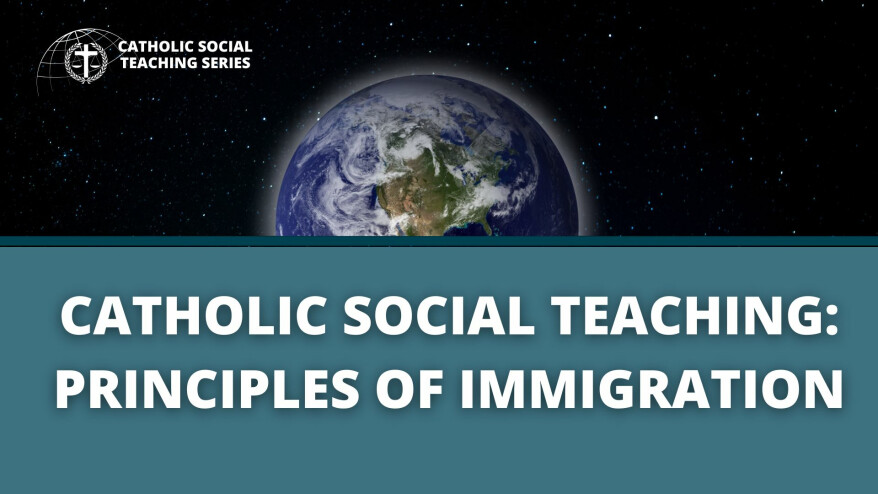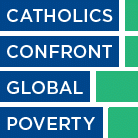What is Social Justice?
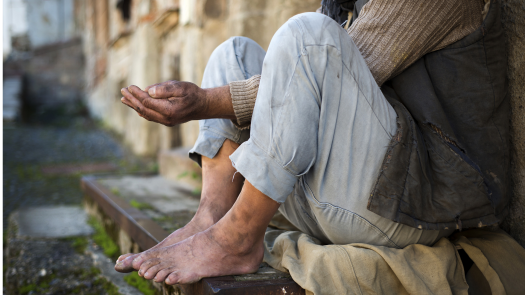
Social Justice is the respect of the human person and the rights which flow from human dignity and guarantee it.
As a community of neighbors, we must provide the conditions that allow people to obtain their rights according to their nature and vocation.

Social Sin is the effect of sin over time:
- Affects society and its institutions
- Creates "structure of sin" ("social sin")
- Includes laws, forms of government, financial, and economic systems and cultural expectations
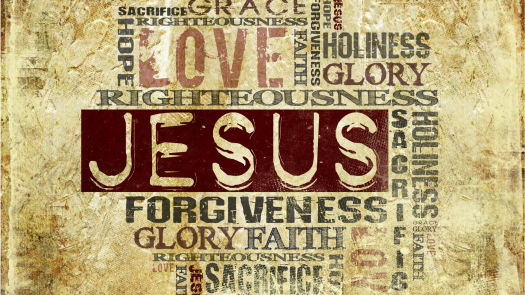
Social Teaching is the teaching (social doctrine) of the Church:
- Truth of revelation about human dignity, human solidarity, and the principles of justice and peace.
- Moral judgment about economic and social matters required by such truth.
- Demands of justice and peace.
What the Social Justice Ministry Does
- Educate on Life, Dignity, and Justice Issues
- We face life, dignity, and justice issues each day
- We educate via presentations to parishioners, Bulletin, eNews, Social Justice web page
- We also organize and schedule the Social Justice and You Speaker Series (see below)
- Respond to requests from Bishops, CCFW, etc.
- Respond to requests for email support or calls to support our Bishops, Pope Francis, Catholic Charities, etc.
- Recent Issues = Immigration, Trafficking, Execution, Creation, Legislation
- We support Catholic Charities Know Poverty and Sponsorship
- Analyze Root Causes of threats to life, dignity, and justice (and impact to us)
- Example: Poverty = a Living Wage is needed for all workers (what can you do?)
- Example: Immigration = U.S. Drug Consumption must be reduced (what can you do?)
- What examples of issues, root causes, and solutions can you identify?
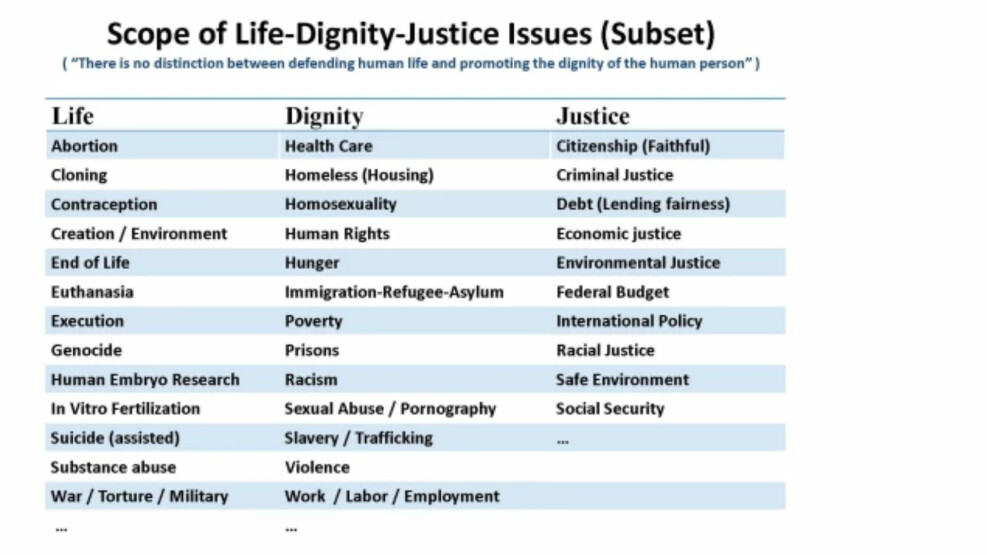
Catholic Social Teachings Speaker Series
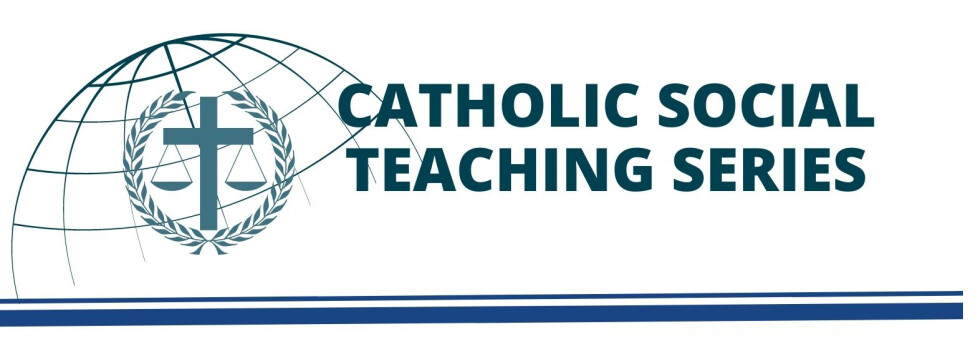
PAST PRESENTATIONS
- CARE FOR CREATION, LAUDATO SI
- CARE FOR CREATION, PART II
- LIFE AND DIGNITY OF THE HUMAN PERSON
- LOVE AND MERCY - OF SELF AND OTHERS
- BIBLICAL JUSTICE
- SOCIAL ENCYCLICALS
- PREFERENTIAL LOVE OF POOR - VULNERABLE
- THE COMMAND TO LOVE GOD & NEIGHBOR
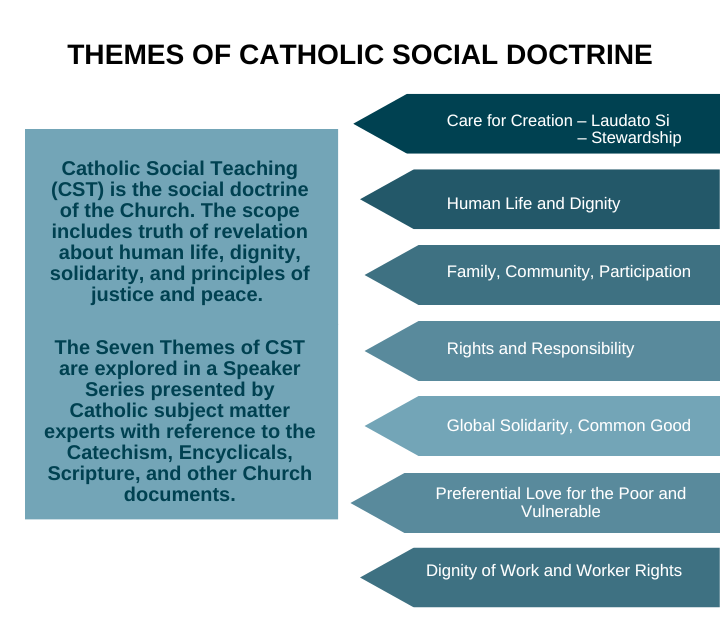
Learn more
Did you know that Scripture has over 2,000 verses about poverty, oppression, and injustice? God is pleading for us to love mercy and justice, feed the poor, and care for the least among us.
- Classes are available to supplement and add detail to what is covered in the Catholic Social Teaching Speaker Series. The following courses are from different sources and price ranges. Each one has slightly different approaches and content.
- Agustine Institute Principles of Catholic Social Teaching ($59)
https://courses.augustineinstitute.org/courses/principles-of-catholic-social-teaching
- Boston College ($60)
- Notre Dame’s McGrath Institute ($99)
https://mcgrath.nd.edu/online-courses/step/courses/catholic-social-teaching/
- University of Dayton Certificate in Social Justice ($105 per class, 5 classes)
https://vlcff.udayton.edu/certificates/social_justice.php
- USCCB Catholic Social Teaching Certificate ($70) – Hispanic Focus
- Ascension (modest cost; geared for Middle/High School)
https://ascensionpress.com/collections/connected-catholic-social-teaching-for-this-generation
- CAPP-USA ($1850)
https://capp-usa.org/2023-certificate-program-in-catholic-social-teaching/
“101. … Our defense of the innocent unborn, for example, needs to be clear, firm and passionate, for at stake is the dignity of a human life, which is always sacred and demands love for each person, regardless of his or her stage of development.
Equally sacred, however, are the lives of the poor, those already born, the destitute, the abandoned and the underprivileged, the vulnerable infirm and elderly exposed to covert euthanasia, the victims of human trafficking, new forms of slavery, and every form of rejection.”
- Guadalupe Radio (KATH 910AM) interview about GSCC Social Justice Ministry
- Learn! Our Bishops act to address the sin of racism and seek solutions.
- Our Bishops and Pope Francis ask us to join the movement to educate, advocate, and pray for an end to the death penalty! Act!
- Learn! How can you live as a people of God in unsettled times?
- Learn! Climate justice is a matter of faith!
- Catholic Church supports comprehensive Immigration Reform. Learn why.
Did You Know?
Resources of Social Justice Ministry
Good Shepherd Social Justice Ministry – www.gscc.net/socialjustice
The ministry at Good Shepherd Catholic Community in Colleyville is responsible for Education, Response, and Analysis of root causes of local issues (Poverty, Immigration; adding Care for Creation soon).
GRACE (Grapevine Relief and Community Exchange) -- https://www.gracegrapevine.org/
Provider of needs and service for those in poverty locally, e.g., Community Clinic, Food Pantry, etc.
Catholic Charities Fort Worth -- https://catholiccharitiesfortworth.org/
Primary partner for education and responding to issues of poverty and immigration, e.g., Shelter 1 Pilot Program and presentations to Good Shepherd.
US Bishop Web Sites
Diocese of Fort Worth -- https://fwdioc.org/
Learn about local issues via existing information, the North Texas Catholic magazine, and organize presentations on key topics, e.g., Human Trafficking, topics relevant to Catholic Social Teaching.
Texas Catholic Conference of Bishops – www.txcatholic.org
Learn about issues via existing documents. Respond to Texas Bishop requests for action via Texas Catholic Advocacy Network, e.g., solidarity with Bishops and organizations at southern border.
US Conference of Catholic Bishops – www.USCCB.org
Learning about issues via existing documents or webinars, e.g., Civilize It, Topics/Issues, etc. Respond to US Bishop request for action, e.g., Abortion, just/unjust legislation, etc.
Organizations
Catholic Climate Covenant -- https://catholicclimatecovenant.org/
Organization to learn about and act upon Care for Creation via resources and webinars.
Catholic Mobilizing Network - https://catholicsmobilizing.org/ Respond to requests for clemency.
Catholic Relief Services. https://www.crs.org/ Respond to requests for support.
National Association of Catholic Social Action and Mission -- https://www.catholicroundtable.org/ Issue resources and webinars.
MIT Living Wage Calculator -- https://livingwage.mit.edu/ Tool to estimate living wage for an area.
PaxChristiUSA.org – Organization for learning about nonviolence via resources and webinars.
PovertyUSA.org – Tool to learn about and analyze poverty data.
Tarrant County Homeless Coalition - https://ahomewithhope.org/ Resources on local homeless.
If you are performing works of charity and mercy now, what more can you do?
- Work for justice in God’s Kingdom on Earth!
- Give 5 minutes a week to help our Bishops solve root causes of injustice in God’s Kingdom!
- If you have more to give, join the Social Justice Ministry.
- Help as we work with Catholic Charities to Shelter 1 homeless family (14 people sheltered to date)!
For more information about Social Justice, Social Sin, and Catholic Social Teaching, read, pray, and reflect on paragraphs 1928, 1931, 1869, and 2419-2422 of the Catechism of the Catholic Church.

 Current Issues
Current Issues
Poverty Awareness

Jesus taught “The Kingdom of God is at hand!” (mentioned over 120 times in the Gospels) Jesus focused on the vulnerable and outcasts, with whom He walked, talked, taught, comforted, healed, and fed. Jesus lived in solidarity with the poor. Do you?
- "I want a Church which is poor and for the poor!" (Pope Francis, Evangelii Gaudium)
- Join the U.S. Bishops and the Catholic Community in the United States in taking up Pope Francis' challenge to live in solidarity with the poor!
- Learn about the many issues of poverty and activities during poverty awareness month (January), e.g., dignity for workers, migration, care for creation, restorative justice, and many more.
Act! If you are performing works of charity now, what more can you do?
- Join with the Social Justice Ministry and Catholic Charities!
- Help us Shelter 1 homeless family (was sleeping in a car)!
- Working with Catholic Charities, we have helped 14 people move into shelter and begin the journey from crisis to stability to thriving!
Contact the Social Justice Ministry coordinator for details on how to get involved (Robert Torres, )
Form and Inform Your Conscience
As Catholics, each of us need a well-formed and informed conscience in order to make good moral choices regarding the many life, dignity, and justice issues around us. It is our ongoing responsibility to learn and mature in our faith as we
- Interact in family, public, and civic life
- Prepare for elections, daily life, Advent, Lent, etc.
Conscience is not a mere "feeling" about what we should or should not do. Our Bishops and Catechism teach that conscience is not something that allows us to justify saying or doing whatever we want.
When well formed and informed, a conscience
- Is the voice of God
- Reveals the truth to us
- Calls us to seek what is good and avoid what is evil
Our Bishops and Catechism provide the steps to form and inform our conscience in an ongoing manner.
- Pray!
- Learn more!
- Apply what you learn! Inform your conscience about one life, dignity, and justice issue, e.g., Reproductive Technology, Living Wage, Immigration, etc. See table below for issues.
- Refer to the Catholic Catechism!
- How would Jesus approach this issue with agape love (unconditional, selfless, active, expressed in action)?
- Examine your conscience!
- Pray again!
- Repeat as human life, dignity, and justice issues arise!
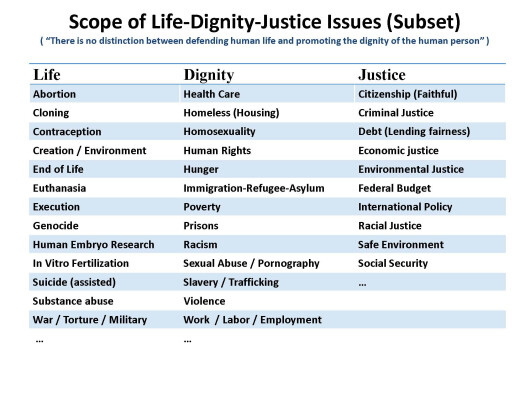
Learn more about Church teachings on these issues and other topics!
How did you do?
Learn more!
- Civil Dialogue:A response to Jesus’ call to love our neighbor
- Deeper Resources for Faithful Citizenship
- Faithful citizenship is a challenge Part 1
- Faithful citizenship is a challenge Part 2
- Faithful Citizenship and Conscience Formation Part 1" by Bishop Olson
- Faithful Citizenship and Conscience Formation Part 2" by Bishop Olson
- Faithful Citizen" by Susan Moses
- Apply Social Teaching: A Policy Positions Primer for Catholic Voters" (22 things to consider)
Protect and Support Refugee Families
Human Trafficking
Care for Creation
Seasons of Creation
God commands us to care for His Kingdom on Earth, each other, and all of His creatures. The Season of Creation is a time to celebrate the gift of God's creation between September 1 and October 4.
- September 1 is the World Day of Prayer for the Care of Creation.
- October 4 is the Feast of St. Francis, patron saint of ecology
-
Following is information from various Catholic sources and actions you can take.
- US Bishops provide info from the perspective of Human Life, Dignity, and Justice
- Care for Creation is one of the 7 principles of Catholic Social Teaching
- Catholic Climate Covenant calls us to act on Catholic teaching on the environment.
- Catholics Confront Global Poverty calls us to defend the life and dignity of neighbors in poverty by protecting creation.
- Laudato Si ... an online version of encyclical by Pope Francis
- Season of Creation gives a global look at action
Taking Action at Home
Brainstorm what lifestyle changes you can make as an individual or family to reduce your own consumption in order to better protect God’s creation. Here are some ideas based on those Pope Francis mentions in Laudato Si’ (no. 211):
- Use fewer paper and plastic products – e.g. use a re-usable water bottle
- Reduce water consumption – e.g. take shorter showers, wash dishes by hand, etc.
- Don’t cook more than you will consume
- Compost (instead of disposing) food waste
- Recycle and reuse instead of disposing
- Use public transportation, carpool, walk, or ride a bike
- Conserve electricity – e.g. turn off lights and buy energy-efficient appliances
- Use sustainable sources of electricity, e.g., wind, solar, or other
- Plant trees and shrubs
- Create natural buffer zones.
- Cultivate small pockets of land, where diverse plants and animals can shelter.
- Even in your home garden or churchyard, you can create diverse habitats this way.
- Leave a border of land along the edge of your garden, walkways or car park.
- Don’t mow or landscape and wild grasses, local plants and wild flowers will grow.
- Conserve a natural area around existing trees or bushes and allow undergrowth to develop, and let leaves and tree limbs fall and decompose
Natural buffer-zones promote the diversity of flora. Wild plants and flowers attract a variety of pollinators such as butterflies. This increases the health and fruitfulness of the plants, which attract local birds. The roots, leaves, and fallen limbs of undisturbed plants provide shelter for insects and small mammals. All of this nourishes the health of the entire ecosystem beyond the buffer zone.
Pass it on ... and spread the Good News by your deeds and words!
If you are performing works of charity and mercy now, what more can you do?
- Work for justice!
- Donate and volunteer with organizations like GSCC Outreach, GRACE, and Catholic Charities.
- Support our Bishops as they advocate for the vulnerable.
- Join the Social Justice Ministry to help solve root causes of injustice (Robert Torres at ).
 Our Call to Action!
Our Call to Action!
Mercy
How sensitive or immune are you to the needs of the poor?
- Do you see pain, and do not touch it?
- Do you hear weeping, but do not comfort it?
- Do you see injustice, but say and do nothing about it?
‘As you did it to one of the least of my brethren, you did it to me.’ (or, if you ignore others you ignore Me)
Act! Touch those in need! Learn more:
If you are performing works of charity and mercy now, what more can you do? Work for justice!
Living a Socially Just Life
THE LEAST OF MY BROTHERS (MATTHEW 25: 34)
Be A Faithful Citizen
Pope Francis Says: "Participate for the common good."
God and Jesus (in Scripture), our Catechism, Pope Francis, and our Bishops teach us to care for creation and each other. Pope Francis and our Bishops also teach us to participate in “politics” for the common good.
- We must form our conscience and deal simultaneously with all life, dignity, and justice issues like
- Abortion
- Death Penalty
- Family
- Environment
- Homelessness
- Living Wage
- Refugees
- In Vitro Ferilization
- End of Life
- Human Rights
- Hunger
- Economic Justice
- Racism
- Imprisonment System
- and many more (Human Life, Dignity, and Justice
- Inform your conscience about all issues (not just one)
- How do your preferred political party, candidate(s), and you conform to God’s values?
- After the election, the journey continues. Apply the best of yourself and your values so that leaders govern for the common good based upon Catholic input.
- Imagine what our lives and country would be like if guided by the values of the Kingdom of God and the decisions God would make if our elected leaders were not in the way!
Learn more! Our Bishops provide the following guidance.
Beatitudes
- Blessed are the poor in spirit, for theirs is the kingdom of heaven.
- Blessed are they who mourn, for they will be comforted.
- Blessed are the meek, for they will inherit the land.
- Blessed are they who hunger and thirst for righteousness, for they will be satisfied.
- Blessed are the merciful, for they will be shown mercy.
- Blessed are the clean of heart, for they will see God.
- Blessed are the peacemakers, for they will be called children of God.
- Blessed are they who are persecuted for the sake of righteousness, for theirs is the kingdom of heaven.
- Blessed are you when they insult you and persecute you and utter every kind of evil against you [falsely] because of me.
-
Rejoice and be glad, for your reward will be great in heaven. Thus they persecuted the prophets who were before you.
Catholic Teaching on Creation

Catholic social teaching, Pope Francis, our bishops, our Catechism, and Scripture teach that we all share the vocation of healing, tending, and caring for a wounded earth. Care for the earth is a requirement of our faith -- out of reverence and respect for God and His creation and to be a neighbor to the poor, who suffer the most from abuses of the environment.
- Pope Francis says: “Nurturing and cherishing creation is a command God gives not only at the beginning of history, but to each of us.”
- Our Bishops call for action to mitigate global climate change based on social and economic justice.
- Our Catechism teaches us to avoid disordered use of things in contempt of the Creator, causing disastrous consequences for us and the environment.
How do you show respect for the Creator by your stewardship of creation? How are you called to cultivate and care for God's creation?
- Act! Try some of the Practical Ideas for Action listed below!
- Read! Catholic Social Teaching of Care for Creation is in our scripture and tradition. See http://tinyurl.com/TeachingCareForCreation.
- Act! Explore our bishops’ Environmental Justice Program. http://tinyurl.com/BishopsEnvironmentalJustice
- Pray! Ask God for light and strength to do your part in healing creation.
If you are performing works of charity and mercy now, what more can you do?
- Work for justice in God’s Kingdom on Earth by helping our Bishops solve root causes of injustice!
- If you have more to give, join the Social Justice Ministry.
- Help as we work with Catholic Charities to Shelter 1 homeless family (14 people sheltered to date)!
- Contact the Social Justice Ministry coordinator (Robert Torres at ).
Practical Ideas for Action
- Conduct a Plastic Audit to find out how much plastic you are throwing away in a week. At the end of the week, conduct another one and compare the results.
- Pledge to remove all single-use plastics from your home, parish, school, or religious community by a certain date. Think about alternatives to plastic dinnerware (cups, plates, knives, spoons, and forks), and disposable plastic bottles. Find biodegradable or washable substitutes. Estimate how much plastic you have avoided. A plastic pollution calculator is available here.
- Coffee cups: If your church serves coffee in the lobby on Sundays, encourage the congregation to start bringing their own non-disposable cups. Have a “mug drive” and encourage everyone to donate one of their extras. Setting out the mugs on the table next to the coffee pot is a good way to reduce paper and plastic waste. How many plastic disposables have you kept out of the landfill or away from streams?
- Attempt to refuse single-use plastic, such as plastic shopping bags, plastic cups, straws, plastic packaging (anything that’s intended to be used only once and then discarded). Try the TOP 4 challenge (refusing plastic bags, bottles, takeaway coffee cups & straws). Pledge to do this for a period of time (summer, a month, a week) and find ways to measure how much plastic your community reduces during that time.
- Does your community use plastic disposable bags while shopping? Initiate a local public information campaign to help people understand the threat that the planet faces due to plastic pollution. Advocate for a plastic bag ban in your community. Perhaps you can sell reusable cloth bags with your community’s logo and Laudato Si’ quote emblazoned on the sides.
- Plan a beach, stream, park cleanup. Estimate the amount of plastic you remove form the environment.
- Refuse “Styrofoam” (polystyrene) food and drink containers. Advocate for a Styrofoam ban in your community.
- Promote the Beyond a Throwaway Culture Program with weekly tips in your bulletins, on a bulletin board, or newsletters.
- Get buy-in with your community by finding a common project to work on and then promote that one. Be creative!
- Incorporate creation care into your worship experiences during your community’s challenge. Check out the Covenant’s website for worship/prayer resources.
- Remember to estimate the amount of plastic reduction you accomplish and report back to Catholic Climate Covenant.
Catholic Teaching on Dignity of Work and Rights of Workers
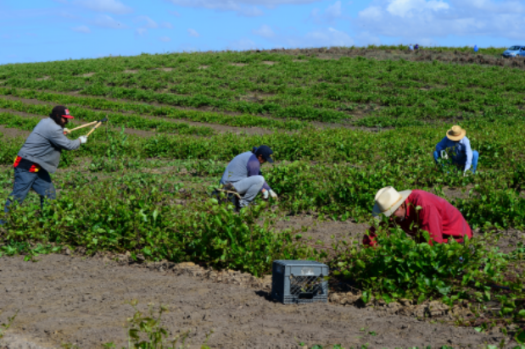
Work is more than a way to earn money. Work is ongoing participation in God’s creation. Catholic Social Teaching leads us to protect the dignity of work and respect the basic rights of workers, e.g.,
- The right to productive work
- Fair (and living) wages (in Matthew 20:1-16, all workers received a living wage at the end of the day!)
- Organization and joining of unions
- Private property
- Economic initiative
Learn more from Scripture and Church Tradition and inform your conscience.
Catholic Teaching on Immigration
God the Father continuously asks us to do challenging things. Jesus does too! Lent is a good time to reflect on our challenges in building the Kingdom of God on earth.
- God may challenge you to become an immigrant and leave your home, as he told Abraham. (Genesis 12: 1-4)
- Jesus does challenge you to “Love your enemies!” (Mt 5:43-48) You may think of an immigrant or refugee as an enemy.
- How much do you really trust God? (Psalm 23:1-4)
- How do you respond to others when God calls on you to do something uncomfortable?
Learn more!
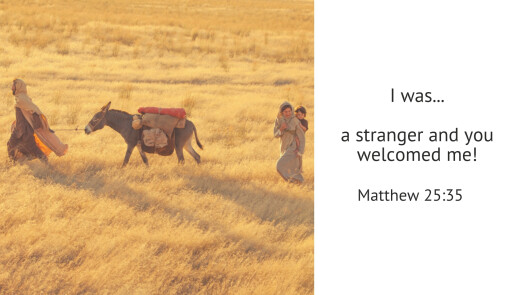
Catholics must deal with many human life, dignity, and justice issues in an informed manner, e.g., welcoming immigrants and refugees.
- Pope Francis and our Bishops provide guidance on how to inform and form your conscience, as well acting and talking in a manner consistent with Catholic Teaching about refugees and immigrants.
- Review “Your Faith and Immigration” and “See with the Heart of Jesus”.
- Pray, examine your conscience, and act with compassion and mercy towards refugees and immigrants!
If you are performing works of charity and mercy now, what more can you do? Work for justice and help resolve root causes! Join the Social Justice Ministry.
- Give 5 minutes a week to support our Bishops in solving the causes of injustice in the Kingdom of God on Earth!
- If you have more to give, join with the Social Justice Ministry and Catholic Charities as we Shelter 1 homeless family (our 3rd) in Tarrant County!
- Contact the Social Justice Ministry coordinator (Robert Torres at ).
Corporal Works of Mercy
Matthew 25: 34 is the source of these. Catholic Charities, GSCC Outreach Ministries and others listed below assist you in performing corporal works of mercy.
Respect Life, Dignity, and Justice for all God's People
“Before I formed you in the womb I knew you, before you were born I dedicated you, a prophet to the nations I appointed you.” Jeremiah 1:4
As we approach Thanksgiving and Christmas, continue the work of respecting the life, dignity, and rights of the unborn and born – especially the poor and unwelcome.
- Threats to human life include abortion, reproductive technology, euthanasia, cloning, embryonic stem cell research, the death penalty, war, the environment (Creation), and more.
- Threats to human dignity include poverty, hunger, homelessness, work without living wages, unaffordable medical care, and more.
-
What will you do when you see human life, dignity, and justice threatened?
God loves each human life from the instant of conception. God entrusts the gifts of life, dignity, and justice to our protection as mothers, fathers, brothers, sisters, and neighbors.
For example:
- Abortion ends the life of an unborn child. It offends God and wounds the men and women involved.
- How do you respect God and life as a steward of human life?
- Read! Learn more about Catholic Teaching on Abortion. See our Catechism at USCCB.org and read https://tinyurl.com/CST-Abortion.
-
Execution ends the life of a human being. The Catholic Church, Pope Francis, and our U.S. and Texas Bishops are against execution.
- God's view is in scripture (He didn't kill Cain after the murder of Abel ... and God actually protected Cain … Genesis 4).
- Jesus halted an execution (John 8:1-11).
- Read! Learn more about Catholic Teaching on Execution. See our Catechism at USCCB.org and read https://tinyurl.com/CST-Execution
-
Human reproductive technology and human embryonic stem cell research ends the life of more unborn humans than abortion. It offends God, takes Him out of creation of human life, and wounds the men and women involved.
- How do you respect God and life as a steward of human life?
- Read! The Human Cost at https://tinyurl.com/IVF-HumanCost
-
Poverty, homelessness, and hunger affect the life and dignity of tens of millions of human beings every single day – mostly because of human injustice.
- Scripture has over 2,000 verses about poverty, oppression, and injustice.
- Jesus focused on the vulnerable and outcasts, with whom He walked, talked, taught, comforted, healed, and fed.
- Jesus lived in solidarity with the poor.
Spiritual Works of Mercy
Teaching of Charitable Works and Social Justice
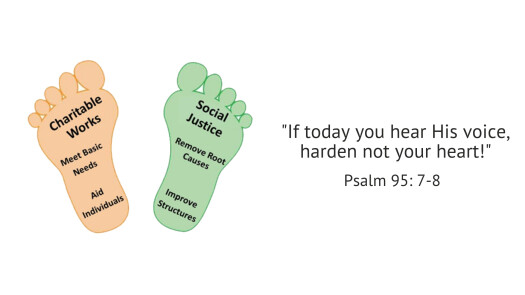
SCRIPTURE HAS OVER 2,000 VERSES ABOUT POVERTY, OPPRESSION, AND INJUSTICE! GOD IS ASKING YOU TO LOVE MERCY AND JUSTICE, FEED THE POOR, SHELTER THE HOMELESS, REDUCE OPPRESSION AND INJUSTICE, AND CARE FOR THE LEAST AMONG US. READ ISAIAH 58: 6-7.
“This rather is the fasting that I wish…
- Release those bound unjustly
- Untie the thongs of the yoke
- Set the oppressed free, break every yoke
- Clothe the naked when you see them
- Share your bread with the hungry
- Shelter the oppressed and the homeless!”
To be a Catholic disciple on mission calls you to put the Two Feet of Love into Action! There are two distinct, but complementary, ways to put the Gospel into action. God calls you to respond to His love through
- Charitable Works -- short-term, emergency assistance for individuals
- Social Justice -- address systemic, root causes of problems that hurt many
You are called to pray, serve, and be generous with the poor and vulnerable.
- Jesus teaches us to live and work for others.
- The Beatitudes (Mt 5:1-12; Lk 6:20-23) tell us that the Kingdom of God belongs to the poor and to those who stand with them, show mercy to them, and hunger for justice (and really trust in God).
- Pope Benedict XVI wrote: “If we love others with charity, then first of all we are just towards them.”
- The Catechism says: Jesus makes charity the new commandment.
Service and generosity includes helping change root cause conditions that oppress human dignity and cause needless human poverty and suffering (justice).
- Ask “why there are so many poor, homeless, hungry, oppressed, prisoners, immigrants, refugees?”
- What “root causes” result in so many to suffer needlessly?
- Lack of a living wage? Lack of affordable housing? Your personal attitudes? Other?
- How are you working to change your status quo of performing charitable works and working on social justice?
An Example. In spite of all that we are doing, there are over 1,900 homeless in Tarrant County. Some 93% of them are vulnerable
- Children 29%
- Women 24% (domestic violence)
- Mentally ill 19%
- Chronic homeless 11% (disabled, etc.)
- Veterans 10% (PTS, etc.)
How can you help assure charity, justice and dignity of life for the poor and the vulnerable? Here are some options. What others do you have?
- Charity. Donate additional funds to Catholic Charities Fort Worth (CCFW) Bridge to Housing program. $33 shelters a homeless person for a day at CCFW.
- Charity. Volunteer your time and talent directly to CCFW homeless programs as a mentor or in other capacities.
- Justice. Support the Social Justice Ministry’s Shelter 1 Project, which provides additional funds and support to CCFW’s Bridge to Housing program to shelter one (1) Tarrant County homeless person/family.
- Along with your current charitable donations, give an additional $1 a week ($50 per year) to help CCFW shelter a homeless person.
- During that time, CCFW case workers and mentors guide a homeless person/family from crisis to stability to thriving in jobs with living wages, savings, and appropriate debt.
- Tell your family and friends about the Shelter 1 Project and become an advocate for their participation.
- For more information, contact the Social Justice Ministry coordinator (Robert Torres, .
- Justice. Value workers by providing and/or advocating for a living wage for all workers ($22 an hour in Tarrant County for 1 adult and 1 child), including lawn care workers, housekeepers, restaurant workers, car wash workers, etc.
- Justice. When you purchase food, goods, and services, ensure that providers and workers are slave free and earn a living wage.
Reflection: Pope Francis says
- “The example of the martyrs also teaches us the importance of charity in the life of faith.…
- It was their refusal to separate the twin commandment of love of God and love of neighbor which impelled them to such great solicitude for the needs of the brethren.
- Their example has much to say to us who live in societies where, alongside immense wealth, dire poverty is silently growing; where the cry of the poor is seldom heeded; and where Christ continues to call out to us, asking us to love and serve him by tending to our brothers and sisters in need.”
ACT!!!
- Pray for strength in compassion, mercy, and justice.
- If you are charitable now, then work for justice.
- Volunteer for outreach opportunities at GSCC.
- Join the Social Justice Ministry (contact Robert Torres, )
More References
Ten Commandments (A Social Justice View)
The Greatest Commandment
- You shall love the Lord, your God, with all your heart, with all your being, with all your strength, and with all our mind,
- and your neighbor as yourself.
Teaching on Execution
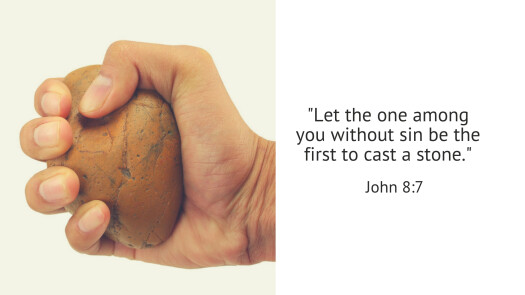
- Learn! Read the Catholic Church position against executions in the revised Catechism, paragraph 2306*
- God's view is documented in scripture (He didn't kill Cain after he murdered Abel ... and God actually protected Cain … Genesis 4).
- Jesus halted an execution (John 8:1-11).
- Learn! Information from our Texas Bishops
- Learn! US Bishops call for abolishing use of death penalty and provide additional background.
Resources
U.S. Catholic Bishops Web Site
Catechism of the Catholic Church
Examination of Conscience in Light of Social Justice
Social Justice and You
Past Presentation
- Justice for the Poor and Vulnerable
- Economic Justice
- Called to be Missionaries, Cheryl Helms and Lyness Henson
- kNOw poverty
- Human Trafficking
- Socially Just Investing (presentation)
- Our Prison System
- Health Needs in our Community
- Being Homeless, Patrick Murphy (Catholic Charities customer)
- Immigration – Telescopic View, Xergio Chacin (Catholic Charities)
- Poverty, Cindy Casey (Catholic Charities)
- Honduras, Roland Rodriguez, Vivian Williams, and Nelson (GSCC Honduras Mission Team)
Do you have a question about this ministry? Click on a name below to contact us.
Ministry Lead: Robert Torres
Staff Contact: Fr. Zachary Burns, 817-421-1387

